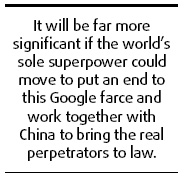Editorials
Stop the Google farce
(China Daily)
Updated: 2010-02-23 07:56
 |
Large Medium Small |
The controversy and issue surrounding the alleged cyber-attack on Google is becoming more absurd and fictionalized as analysts in the United States continue their attempts to prove the fallacy that the Chinese government is behind last month's hacking attacks.
Watching the Google farce unfold is akin to reading an awkward copy of Dan Brown's fiction Digital Fortress. The book succeeds in building a near flawless plot of government surveillance of digital information against the institution of civil liberties and ethics.
| ||||
To further its allegations that computers in two Chinese education institutions were the culprits in the cyber-attacks, US analysts revealed in Monday's Financial Times that they have identified the author of the programming code. According to the newspaper, the discovery came after US analysts tracked the launch of the spyware to computers inside the two Chinese schools.
Such evidence can hardly hold water.

It does not take a computer scientist to know that cyber-attacks happen to many websites many times everyday and hackers could easily use modern techniques to remotely control a computer and launch attacks on a chosen target. This partly contributes to the headache of identifying hackers worldwide in recent years.
Even if the US evidence could be proven, the two Chinese schools are also victims of cyber-attacks.
Apparently, some in the US have turned a deaf ear to the Chinese government's repeated counterstatement to the accusation. Neither did they listen to Saturday's response from the two Chinese education institutions that have denied any involvement in the cyber-attacks.
This uncompromising attitude can only make people doubt whether the real intention behind all this is to ferret out the wrongdoers and restore order in cyber-world.
Instead, there is strong evidence that some in the US want the Google issue to snowball into a political issue.
If this is the case, it could only push the already flagging bilateral ties to plunge deeper into troubled waters.
Instead of making groundless accusations against a country that the US has vowed to build mutual trust with, it will be far more significant if the world's sole superpower could move to put an end to this Google farce and work together with China to bring the real perpetrators to law.
The China-US relationship has seen enough conflicts so far this year. Adding more fuel to the tension is in neither country's interests.
Washington needs to weigh the interests of a single company against its national interests in maintaining a sound relationship with the world's biggest developing country. It's a test for real statesmanship and only those with insight could pass with credit.












